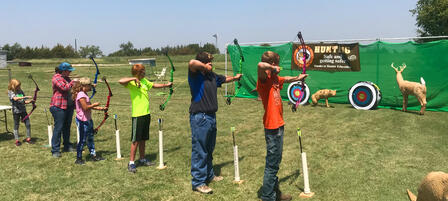KDWPT, Kansas Schools Team Up to Teach Hunter Education

PRATT – The Kansas Department of Wildlife, Parks and Tourism (KDWPT) will continue to partner with school districts across the state to offer the Hunter Education in Our Schools program in 2020. The Hunter Education in Our Schools program is an opportunity for students to learn safety, ethics and responsibility while hunting, among other outdoor skills. All associated materials and trainings for the Hunter Education in Our Schools program are free for participating schools.
In 2019, 467 middle school and high school students successfully passed the course and earned their Kansas hunter education certificate. To date, nearly 60 Kansas schools have incorporated the Hunter Education in Our Schools program into their curriculum.
“This program teaches students fundamental life skills through hands-on activities in classes taught at their school,” said Aaron Austin, KDWPT outdoor skills and recruitment coordinator. “It gives the students who might not have an initial interest in hunting, or the available time on the weekend for a hunter education course, the chance to learn those skills with their peers.”
While most participating schools are located in rural areas, approximately 10 percent are considered urban – locations in which Austin would like to see the program expand.
“We’ve had great feedback from teachers and students, especially from urban school districts,” said Austin. “Many of these students likely would not have taken time outside of school hours to learn about hunting and firearms safety, but thanks to this program, students don’t have to choose. Schools are providing that education to them during regular school hours.”
In addition to earning their hunter education certificate, students who choose to participate in the Hunter Education in Our Schools program also earn credits in disciplines such as science, civics-government, history and physical education. Following successful completion of the course, students are able to:
- Describe the difference between state-regulated hunting laws and a hunter's ethics
- Demonstrate safe firearm handling skills
- Describe the basic principles of wildlife management
- Identify the differences between conservation and preservation
- Identify common game animals, and more
For more information, including how to bring the Hunter Education in Our Schools program to a school near you, visit https://ksoutdoors.com/Services/Education/Hunter/Hunter-Education-In-Our-Schools or contact KDWPT’s Education Section at (620) 672-5911.
-30-







